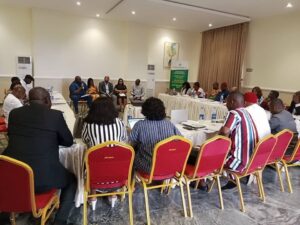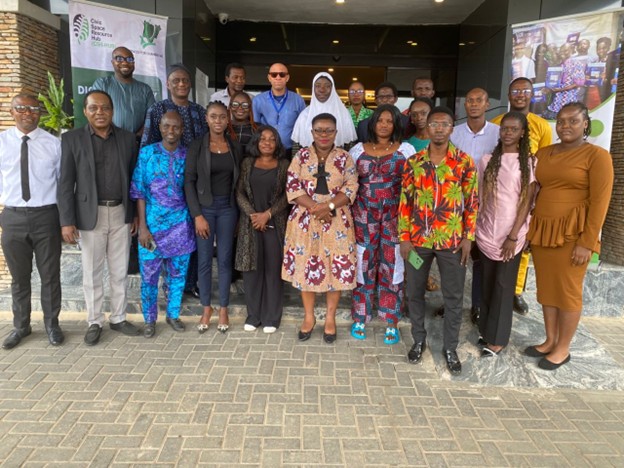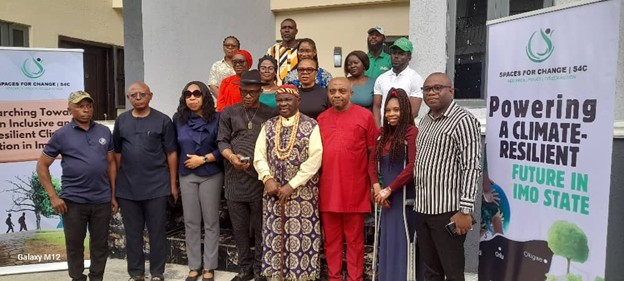Emerging and proposed “solutions” for achieving a just transition are technical in nature, failing to acknowledge the entrenched power and political dynamics of energy in resource-rich communities and countries. Against this backdrop, Spaces for Change | S4C, in collaboration with the Institute of Development Studies (IDS), hosted a one-day symposium on advancing a just and inclusive energy transition in Nigeria. Twenty-five (25) stakeholders, comprising civil society organizations, government officials, academics, and representatives from oil-producing communities attended the symposium convened under the banner of the Just Transition Learning Project’ on October 25, 2023.
Matching its climate commitments with action, Nigeria is the first African country to design an energy transition plan (ETP) in 2021. With particular emphasis on using gas as a transition fuel for expanding energy access and eradicating energy poverty, the ETP outlines national strategies and action plans to cut emissions and reach net-zero by 2060. Diverse public and private institutions and groups—like Spaces for Change—have rolled out advocacy, policy, and infrastructure development initiatives aimed at interrogating the inclusiveness of the ETP while proffering recommendations for bolstering the implementation of national action plans to transition away from fossil fuels. What’s working and what’s not working in organizational and activist processes of advocacy, struggles, and coalition building to achieve a just and inclusive transition?
An array of presentations by diverse experts and stakeholders from the Nigerian extractives industry outlined various emission sources, numerous renewable energy interventions, and advocacy strategies initiated by both state and federal governments as well as civil society organizations to drive energy transition in Nigeria. Community-based initiatives and efforts to promote renewable energies (like solar power) in rural communities were also highlighted. Specific presentations also unpacked the advocacy processes that have proven effective, including building a strong network of civil society organizations and creating people-driven advocacy strategies that revolve around alternative energy sources.
The presentations showed that the roles and responsibilities for achieving the country’s climate targets were often overlapping and fragmented across several state and federal agencies. A panel discussion examined the strategies for promoting inter-agency collaboration for a clean energy future in Nigeria. The panelists comprised representatives of federal government agencies such as the National Oil Spill Detection & Response Agency (NOSDRA), Nigeria Extractives Industries Transparency Initiative (NEITI), the Hydrocarbon Pollution Remediation Project (HYPREP), and the National Human Rights Commission (NHRC). They explained the roles and efforts of these agencies in supporting energy transition, the obstacles to effective collaboration and concerns regarding environmental accountability in oil-bearing communities. There was consensus among panelists that inter-agency collaboration is crucial to achieving net-zero by 2060.
Taking the overlapping roles of agencies into account, how can stakeholders begin to articulate a common framework for understanding what just transitions mean and to whom, setting out principles and parameters for engagement? Participants jointly examined a plethora of existing just transition frameworks from various countries and agencies, assessing their compatibility and applicability to the local context. Some frameworks examined included the GIZ Just Transition Orientation Framework, the Climate Justice Alliance Framework, the Just Transition Initiative Framework, the Stockholm Environment Institute Framework, the Alliance for a Just Energy Transformation, Hirsch, Matthess, and Fünfgelt’s Just Energy Transition Principles, and the Impact Taskforce Just Transition Framework. To undertake this assessment, participants moved into breakout group discussions to map frameworks that should govern a just transition in Nigeria’s unique context.
The recommendations made at the end of the breakout discussions emphasized the importance of centering national transition plans on principles such as promoting inclusivity, creating meaningful employment, equitable resource distribution and power, preserving culture, upholding community voice and power, fair sharing of benefits and harm, and respect for indigenous and local community rights. Others include the principle of equitable benefit-sharing, supporting people and communities affected by adaptation measures, addressing global inequalities, providing international support for vulnerable regions and communities, social cohesion, and equitable distribution of resources and power. A consistent theme throughout these recommendations is ‘leave no one behind.’
The final session delved into strategies for building alliances across agencies and civil society necessary for clamoring for the agreed principles through a collective vision. To be effective, collective action plans must advance the inclusion of host communities and voices from the margins. Along these lines, participants discussed ways of gathering new ideas, thoughts, and strategies for establishing new platforms or alliances to unite groups and policy advocates working on energy transition. The symposium wrapped up with recommendations for strengthening the engagement of marginalized voices and communities in energy transition debates and processes at the national, regional, and international levels.




